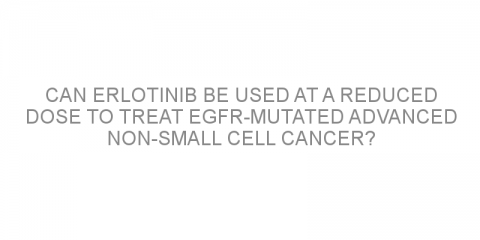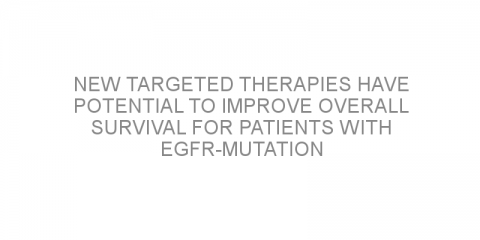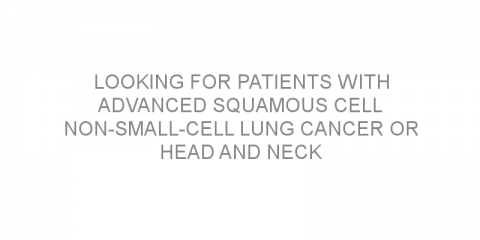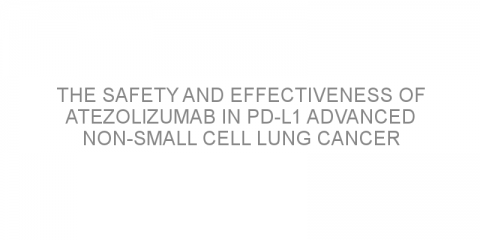In a nutshell This study investigated the safety and effectiveness of afatinib (Gilotrif) in patients with non-small cell lung cancer (NSCLC) who have not previously received EGFR tyrosine kinase inhibitors (TKIs). Data showed that afatinib was well tolerated and improved the outcomes of these patients. Some background NSCLC...
Read MoreCurrent stage-Stage III-III-B Posts on Medivizor
Can erlotinib be used at a reduced dose to treat EGFR-mutated advanced non-small cell cancer?
In a nutshell This study was carried out to look at the use of a reduced dose of erlotinib (Tarceva) in the treatment of EGFR-mutated advanced non-small cell lung cancer (NSCLC). The authors found that lower-dose erlotinib was as effective as standard dose gefitinib (Iressa) in these patients. Some background NSCLC is the...
Read MoreSearching for patients with lung cancer to trial a treatment combination
In a nutshell This phase 3 trial will investigate the effectiveness of cemiplimab (Libtayo) and ipilimumab (Yervoy) in combination with platinum-based chemotherapy in patients with advanced non-small cell lung cancer (NSCLC). The main outcome will be response to treatment and survival without cancer growing or spreading. The...
Read MoreNew targeted therapies have potential to improve overall survival for patients with EGFR-mutation positive NSCLC
In a nutshell This study compared dacomitinib (PF-00299804) to gefitinib (Iressa) as a first treatment for patients with EGFR-mutation positive non-small-cell lung cancer. The authors concluded that treatment with dacomitinib provided an improved overall survival compared to gefitinib. Some background Current cancer therapy heavily...
Read MoreDoes a medication used to treat diabetes have anti-cancer potential?
In a nutshell This study looked at the anticancer effect of metformin (Glucophage), a drug commonly used to treat type 2 diabetes. The authors concluded that metformin in combination with current cancer therapies such as chemotherapy improved progression free survival in patients with advanced non-small-cell lung cancer. Some background Patients with...
Read MoreLooking for patients with advanced squamous cell non-small-cell lung cancer or head and neck squamous cell carcinoma to test a new type of immunotherapy
In a nutshell This phase 1 trial is examining the safety and effectiveness of a new type of immunotherapy. The treatment involves genetically enhancing patients’ own immune cells to better fight advanced non-small-cell lung cancer (NSCLC) or head and neck cancer. The main outcome to be measured will be the highest safe dose of the treatment. This...
Read MoreIdentifying factors to predict treatment prognosis in EGFR positive non-small-cell lung cancer
In a nutshell The authors examined whether the lymphocyte to monocyte ratio (LMR) could predict outcome in patients with late stage EGFR positive non-small-cell lung cancer (NSCLC). They concluded LMR could be beneficial in predicting outcome for patients with EGFR positive NSCLC patients receiving first-line EGFR-TKIs. Some background Some...
Read MoreZoledronic acid as an option for HER2-negative breast cancer
In a nutshell This study aimed to investigate zoledronic acid in combination with chemotherapy as a treatment for HER2-negative breast cancer. This study concluded that the addition of zoledronic acid to chemotherapy has potential benefits for certain breast cancer patients. Some background HER2-negative breast cancer (BC) differs from...
Read MoreThe safety and effectiveness of atezolizumab in PD-L1 advanced non-small cell lung cancer
In a nutshell This trial looked at the effectiveness and safety of an immunotherapy drug, atezolizumab (Tecentriq). The authors concluded that this drug is effective and safe to treat patients with advanced non-small-cell lung cancer who have high levels of the PD-L1 protein. Some background Immunotherapy is a fairly new type of cancer treatment....
Read MoreCombining chemotherapy and immunotherapy for advanced NSCLC
In a nutshell This trial determined whether combining chemotherapy and immunotherapy would be beneficial for patients with advanced non-small-cell lung cancer (NSCLC). The authors concluded that a combination of chemotherapy agents, carboplatin (Paraplatin) and pemetrexed (Alimta), with the immunotherapy agent pembrolizumab (Keytruda) was tolerable and...
Read MoreA new drug for the treatment of metastatic ALK-positive NSCLC
In a nutshell The authors aimed to summarize the results of two clinical trials to determine the effectiveness of alectinib as treatment for ALK-mutation positive NSCLC that has progressed beyond crizotinib. They concluded that alectinib is a suitable drug to treat this patient population. This treatment was FDA approved in 2015. Some...
Read MoreIs there a link between weight gain and treatment outcomes for non small cell lung cancer?
In a nutshell This study examined the link between weight gain and survival in patients with non-small-cell lung cancer (NSCLC). The authors concluded that patients who experience weight gain during treatment have a survival benefit compared to those who continue to lose weight. Some background Unintentional weight loss occurs among...
Read More











